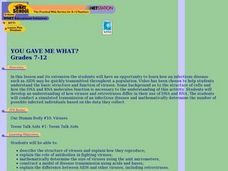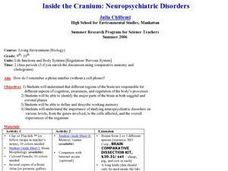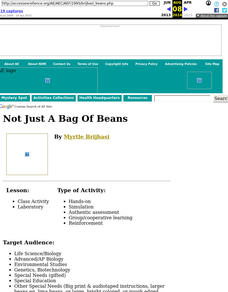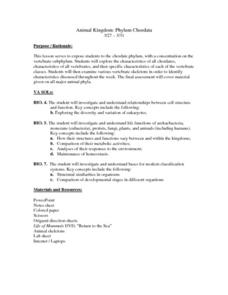Curated OER
You Gave Me What?
Young scholars see how an infectious disease such as AIDS may be quickly transmitted throughout a population. They conduct a simulated transmission of an infectious disease and mathematically determine the number of possible infected...
Curated OER
Pliable Proteins
Young scholars make models of protiens using wire and paperclips. They are given step by step instructions with lots of information about proteins throughout the directions. They make the three basic structual elements of proteins;...
Curated OER
Nucleic Acids and Protein Synthesis
Tenth graders complete a vocabulary assignment based on terms in the unit. They complete appropriate worksheets as each section of the unit is completed. They participate in classroom discussions. They construct a model of a DNA molecule.
Curated OER
Embryology as Evidence of Evolution
Learners observe the two major developmental pathways (protostome and deuterostome). They analyze data regarding differences in nucleotide sequences and construct a phylogenetic tree. They observe the similar evolutionary history shared...
Curated OER
Characteristics of Snakes and Turtles
Learners examine the characteristics of snakes and turtles and compare/contrast reptiles with mammals. They watch a video, answer discussion questions, complete information charts, conduct Internet research, and create a habitat diorama.
Curated OER
Decisions Today for a Healthy Tomorrow
Students explore a variety of factors that affect the health of the bone, muscle, and skin systems. Healthy lifestyle recommendations which include behaviors over which we have control are explored in this lesson.
Curated OER
Inside the Cranium: Neuropsychiatric Disorders
Students analyze different regions of the brain which are responsible for different aspects of cognition, awareness and regulating the body's process.
Curated OER
Not Just a Bag of Beans
Learners determine the types of natural selection and variation that exists in a population, using beans.
Curated OER
Protein Synthesis Activities
Students participate in a teacher-guided activity to teach about protein synthesis. Student roles include one person as the DNA molecule, another is a single stranded sequence of complementary mRNA.
Curated OER
Panther Exam: Writing a Play
Students demonstrate their knowledge of panthers by writing a play on the subject. In this animal life instructional activity, students view a slide-show on school computers of a veterinary exam of a panther. Students utilize this...
Curated OER
Light Microscopes
Seventh graders study the parts of a light microscope, and its proper use. They identify each part and explain why it is important to know how to use this tool. They practice observing newsprint on a wet mount slide.
Curated OER
PARAMECIUM RESPONSES TO STIMIULI
Students design the test they use to examine, how the paramecium move, feed, and react to different types of stimuli such as a drop of vinegar. They conduct a lab experiment using a microscope.
Curated OER
Inheritance Patterns in Zorks
In this inheritance patterns worksheet, students create a visual of a Zork using chromosome strips to represent alleles from the father and the mother to determine the traits in the offspring. Students translate the genotype to the...
Curated OER
Virus Tracker
Sixth graders will simulate the spread of a virus such as HIV through a population by "sharing" (but not drinking) the water in a plastic cup with several classmates. Although invisible, the water in a few of the cups will already be...
Curated OER
Blood Business
Students identify the different kinds of blood. For this biology lesson, students investigate the antigens, agglutinins and Rh factor using their own blood. They use Punnett squares to predict blood type of offspring.
Curated OER
Smart Move!
Learners visualize a communication system. They encode, decode, transmit, receive and store messages. Students use a code sheet and flashlight for this process. They will also maintain a storage sheet from which they can retrieve...
Curated OER
Using Abiotic and Biotic Parameters to Monitor Air Quality
Students identify the abiotic factors that influence a river or stream and the organisms that live in it. They measure several abiotic and biotic parameters to gauge water quality. Students examine the biotic environment by identifying...
Curated OER
Introduction to Adult Insects and Their Adaptations
Students study organisms found in Class Insecta. They examine the different adaptations these organisms have developed over time to survive and prosper in their respective habitats. They research the origin of the names of several orders...
Curated OER
High School Bag Design
High schoolers design a bag that they would personally use to carry needed items to school. In this bag design lesson, students observe real bags and assess needs and wants for a new bag. High schoolers brainstorm design solutions and...
Curated OER
What is a Seed?
First graders identify the parts of a seed. In this plant biology lesson, 1st graders are given a seed and identify each part of the seed by using a hand lens. Students plant a seed and graph the growth.
Curated OER
Can Photosynthesis Occur at Saturn?
Students identify the different requirements for photosynthesis to take place. In this space science lesson plan, students simulate conditions in Saturn to investigate if photosynthesis is possible there. They use data and observations...
Curated OER
Movement, it's FUN-damental!
Students discover how muscles work. In this biology lesson, students explain the causes of fatigue and muscle soreness. They create graphs and compare results with their classmate.
Curated OER
Animal Kingdom: Phylum Chordata
Students use a dichotomous key to classify various vertebrate jar speciments into classes. They examine the speciments for general characteristics of each class and fill in a corresponding chart and then complete a few final assessment...
Curated OER
Invertebrate Classification
Students discuss the recent disovery of the "furry lobster" to peak interest in the animal kingdom. They classify various speciments using invertebrate dichotomous keys, identifying major animal phyla and classes. Thy the complete the...

























